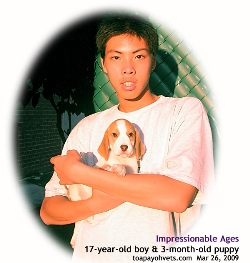It was one of those rare times
this 17-year-old boy in the picture visited his Dad at the
Veterinary Surgery. He
was so busy doing his own things and going to school. His brother was
present but he disliked being photographed and showed a black face to the camera.
He was sulking as he had been
deprived of his addiction to on-line gaming by being asked to be present at
his Dad's Veterinary Surgery.
The elder brother was 17 years
old. He was OK with photography and the
Beagle puppy was OK. Therefore, his picture appeared serene and his
intense eyes in the afternoon glow of sunset rays matched the bright shiny eyes
of the Beagle puppy at one perfect moment in time. The photo of a
eye-contact of puppy and boy is extremely difficult to capture.
 The puppy only looked at the
camera in that split second as he would not stay still unlike the patient
17-year-old boy. Still you would not expect both parties to pose with
eye-contact in this way for a few seconds as you could see in the last
photograph of the maid and the puppy below. In photography, eye-contact
makes a picture of great interest to the viewer and is much valued by any
good photographer. The puppy only looked at the
camera in that split second as he would not stay still unlike the patient
17-year-old boy. Still you would not expect both parties to pose with
eye-contact in this way for a few seconds as you could see in the last
photograph of the maid and the puppy below. In photography, eye-contact
makes a picture of great interest to the viewer and is much valued by any
good photographer.
The Beagle puppy was sold via the
internet put up by his Dad who fervently believed that internet marketing
for a Hokkien-speaking breeder not proficient in the English language would
help the breeder to survive in his business.
The breeder had to sell his puppies to
pet shops at sharp discounts as he had no pet shops and did not think
of selling puppies from his kennels unlike his neighbours who was doing a
roaring business as puppy buyers drove by during weekends to buy puppies in
the North Eastern part of Singapore.
"Too much trouble in the after-sales service of the puppy," he said to the
Dad. "This internet issue is a waste of money."
One pet shop operator would demand compensation or replacement puppies from
him if the puppies died at the pet shop for any reason. He had no choice but
to accept this condition of sale as the other pet shop operators did not
take his puppies regularly.
If this breeder could market his puppies in the internet, he would earn
more, cutting out the middle man. But he did not know how to use the
internet. Neither did he ask his son who was studying at the polytechnic. "A
waste of money to invest in computers and software," he reiterated to the
Dad who often visited his kennels to vaccinate his puppies. Webmasters
charged a bomb to put up webpages and they would disappear after some time
if they provided free services. So, it was understandable that the breeder
was wary of throwing good money to the geeks and the nerds.
 The breeder had to save money to buy better quality breeds and expand his
production. Better quality meant higher prices although most Singaporean
buyers were only interested in "cheap and good" puppies at that time.
Is that such thing as a cheap and good puppy? The breeder had to save money to buy better quality breeds and expand his
production. Better quality meant higher prices although most Singaporean
buyers were only interested in "cheap and good" puppies at that time.
Is that such thing as a cheap and good puppy?
Every dollar saved by the breeder counted as he focused on expanding his
business by importing top quality breeds and producing excellent puppies.
He had two sons. One was around 17-year-old and was studying in the
polytechnic. He was not interested in the internet nor did he get the necessary
support and money from his Dad even if he were keen. There was no motivation
for him at this impressionable age. What benefits would accrue to him
if he set up the website? He had to maintain it to give it a fresh face
every day.
But which young boy living in Singapore, a busy growing city
with too many distractions would volunteer to spend time helping his Dad in business?
To know the tricks of the trade? To join forces against the competition and
to sustain the profitability of the business? To help the "hand that feeds
him?"
One professor e-mailed wanting to buy this Beagle from a batch of 4 as
pictured in the web page set up for the breeder by the vet. He wanted the
one with the most white coat patch. As a present for his Primary Six
Leaving Examination (PSLE) daughter who would perform well in her
academic studies, based on her consistent high marks in her term
examinations. However, his daughter had not completed her PSLE examinations
till 2 weeks later. Therefore, she would be
distracted if the puppy arrived much too soon and it would no longer be a
surprise.
"I would like the breeder to keep the puppy for the next 2 weeks," the
professor said to the Dad. The breeder said "No, take it or leave it". He
had no problem selling his puppies and why should he have to take the risk.
If the puppy dies at his kennel, he would have to compensate the Buyer and
face acrimonious allegations. Puppies do die of parvoviral infections at all
breeding kennels one time or another. Puppies were sold with one vaccination
as they would then be more cute and in greater demand. The government had
not enforced its regulation of 2-weeks-after-the-second-vaccination sale of
local puppies at that time.
A wave of parvoviral infection
would kill many pups, sometimes wiping out the puppies. Pet shop operators
who sold puppies got complaints of deaths and demands of compensation.
Then there would be peace and prosperity. It was as if the batch of puppies
did not have maternal antibodies or there was a new serotype of virus and
that was why they died. Could the breeder be using ineffective vaccines and
therefore the blame fell on the veterinarian for not providing good
vaccines. The veterinarian blamed the manufacturer. The latter disclaimed
responsibility. Several hundred thousand dollars of puppies would be lost.
So the Dad understood the breeder's rationale and caution for not accepting
the boarding of this Beagle at any price.
Now, there was a brilliant school
girl of 12 years old who would be having a present from the busy father. If
the breeder would not accept the boarding of the puppy after the sale, this
girl would get no Beagle puppy. It was the best of the litter of four, with
more white than brown. A strikingly handsome puppy which was from the Taiwan
breeding stock. Unlike the Beagles from Australia, he was around 50% smaller
in size. Not too large to live in a condo unlike the common show-dog
Beagles. A "miniature" Beagle.
In
Singapore at that time and now in 2009, Beagles were rarely available for
sale or at the pet shops, unlike Shih Tzus,
Malteses and Chihuahuas. The professor had chosen this puppy as a
surprise present for his beloved daughter.
"Why don't you board the puppy for me in your Veterinary Surgery?" the
professor asked the 17-year-old boy's Dad. "After all, if the puppy were to
fall sick, you could treat him." If only it was as simple as that. Not all
diseases, especially parvoviral diseases in puppies can be treated
successfully. Puppies with one vaccination do die of parvoviral diseases and
this was a number one cause of death in puppies, especially in breeding
kennels and probably in small animal practices, all over the world.
Money was not a problem with this professor. In any case, the boarding and
caring of the puppy would not cost a bomb. This was not a financial issue.
So, should the 17-year-old boy's Dad accommodate the request of this
professor who contacted him via the internet? Pragmatically, the answer
should be no. Why take the risk as his practice was also a small animal
practice and parvoviral puppy patients would be around occasionally.
What should be done? The simplest way was to say sorry to the professor.
That would be the end of a surprise present for this PSLE girl. There must
be a solution to this situation. Can you think of how you would resolve the
problem of the professor? The puppy should not be boarded at the breeding
kennel nor at the Veterinary Surgery due to concerns about contagious and
infectious parvoviral diseases.
 The PSLE girl
would perform well in her examination. Her father wanted to reward her
with a surprise present. Much would now depend on how to help him. A
conflict of interest was present. The puppy could die of parvoviral infections if boarded at
the Veterinary Surgery. By rejecting the professor, the breeder would not be
selling his puppy to a good home as he would then sell it to a pet shop
operator. At the pet shop, the puppy might get infected with parvoviral
disease and die. The professor who was not a professor of veterinary
medicine seemed to think that all
sick puppies could be easily cured by the veterinarian. The PSLE girl
would perform well in her examination. Her father wanted to reward her
with a surprise present. Much would now depend on how to help him. A
conflict of interest was present. The puppy could die of parvoviral infections if boarded at
the Veterinary Surgery. By rejecting the professor, the breeder would not be
selling his puppy to a good home as he would then sell it to a pet shop
operator. At the pet shop, the puppy might get infected with parvoviral
disease and die. The professor who was not a professor of veterinary
medicine seemed to think that all
sick puppies could be easily cured by the veterinarian.
There was not much time to make a decision as to whether to enable the
professor to present his daughter with a Beagle. It must be a Beagle and he
had great difficulty finding one from the pet shops. There simply were no
Beagle puppies for sale in Singapore then and now.
A decision needed to be was fast. This puppy was growing fast and needed a
good home. This professor would provide him a good home. No doubt about it.
The puppy was boarded at the 17-year-old boy's home for 2 weeks. The boy was
so busy with his own things. He did not really know that the puppy
existed. His house was his hotel as his friends invited him out to Zouk and
other parties and group studies. His parents saw little of him.
The domestic helper cared for the
puppy. He went home after two weeks and is the best friend of the PSLE girl
who is now 17 years old. The 17-year-old boy is now 23 years old and has his
own puppy. His mother was not in favour of him keeping a puppy at home when
he asked for one. In some families, there might be one parent who would be
against puppy ownership for the child. This could not be helped. But
time had passed by fast and the grown up boy bought his own puppy.
Happy birthday, 23-year-old boy. This is an electronic birthday card
for you.
XXX
From your Dad and Mum. |
 TOA
PAYOH VETS
TOA
PAYOH VETS TOA
PAYOH VETS
TOA
PAYOH VETS